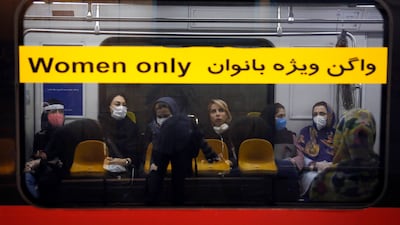Restrictions on women's freedoms in Iran are tightening as authorities plan to bar women who refuse to wear the hijab from the Tehran Metro.
Tehran municipality announced it has formed a security unit to stop women without a head covering from entering the capital's light rail network.
“We will proceed according to the country’s laws in this regard. Our first step is issuing notices, then we issue warnings to the unveiled women, and in the third stage we prevent them from entering the metro stations,” said Tehran Mayor Alireza Zakani.
There were nationwide protests following the death of Mahsa Amini, a Kurdish woman who died in morality police custody after her arrest for allegedly wearing her hijab improperly.
Her death prompted the biggest street protests in Iran for years. Those resulted in the deaths of more than 500 people and at least 18,000 were arrested.
Many women have openly defied Iran's dress code since then as a mark of rebellion against authorities, with hijab-burning a feature of many demonstrations, while authorities have promised stricter rules.
Universities are to bar female students who do not wear the hijab from many services, the government announced this month, days after the judiciary chief promised to prosecute women who defy the hijab regulations “without mercy”.
Authorities sealed thousands of businesses across Iranian cities in the past few weeks, including restaurants, cafes, tourist accommodation, shops and a counselling clinic, in response to women’s refusal to wear the hijab, Iran International reported.
Social media users this week posted videos of women passing through metro stations without a hijab, while others were seen being turned away at the gates by uniformed guards and women in chadors.
They were only allowed to pass once they put on a headscarf.
“As if Mahsa Amini was only killed six months ago for not wearing her hijab,” said one traveller.
Curtains have also been installed between men's and women's carriages on the metro, which officials said will be fitted on all trains “within the next few weeks”.
Extra staff have also been sent to health clinics to enforce rules as part of “chastity and hijab units”, Farsi media reported.
Clinic managers and municipality staff must remind patients and their companions of the “command” to wear hijab, Radio Farda said, while reports are to be sent to Tehran authorities on the “status of the hijab in the city's clinics”.
Heather, the Totality
Matthew Weiner,
Canongate
White hydrogen: Naturally occurring hydrogen
Chromite: Hard, metallic mineral containing iron oxide and chromium oxide
Ultramafic rocks: Dark-coloured rocks rich in magnesium or iron with very low silica content
Ophiolite: A section of the earth’s crust, which is oceanic in nature that has since been uplifted and exposed on land
Olivine: A commonly occurring magnesium iron silicate mineral that derives its name for its olive-green yellow-green colour
Results
Female 49kg: Mayssa Bastos (BRA) bt Thamires Aquino (BRA); points 0-0 (advantage points points 1-0).
Female 55kg: Bianca Basilio (BRA) bt Amal Amjahid (BEL); points 4-2.
Female 62kg: Beatriz Mesquita (BRA) v Ffion Davies (GBR); 10-2.
Female 70kg: Thamara Silva (BRA) bt Alessandra Moss (AUS); submission.
Female 90kg: Gabreili Passanha (BRA) bt Claire-France Thevenon (FRA); submission.
Male 56kg: Hiago George (BRA) bt Carlos Alberto da Silva (BRA); 2-2 (2-0)
Male 62kg: Gabriel de Sousa (BRA) bt Joao Miyao (BRA); 2-2 (2-1)
Male 69kg: Paulo Miyao (BRA) bt Isaac Doederlein (USA); 2-2 (2-2) Ref decision.
Male 77kg: Tommy Langarkar (NOR) by Oliver Lovell (GBR); submission.
Male 85kg: Rudson Mateus Teles (BRA) bt Faisal Al Ketbi (UAE); 2-2 (1-1) Ref decision.
Male 94kg: Kaynan Duarte (BRA) bt Adam Wardzinski (POL); submission.
Male 110kg: Joao Rocha (BRA) bt Yahia Mansoor Al Hammadi (UAE); submission.
New UK refugee system
- A new “core protection” for refugees moving from permanent to a more basic, temporary protection
- Shortened leave to remain - refugees will receive 30 months instead of five years
- A longer path to settlement with no indefinite settled status until a refugee has spent 20 years in Britain
- To encourage refugees to integrate the government will encourage them to out of the core protection route wherever possible.
- Under core protection there will be no automatic right to family reunion
- Refugees will have a reduced right to public funds
KILLING OF QASSEM SULEIMANI
more from Janine di Giovanni
Another way to earn air miles
In addition to the Emirates and Etihad programmes, there is the Air Miles Middle East card, which offers members the ability to choose any airline, has no black-out dates and no restrictions on seat availability. Air Miles is linked up to HSBC credit cards and can also be earned through retail partners such as Spinneys, Sharaf DG and The Toy Store.
An Emirates Dubai-London round-trip ticket costs 180,000 miles on the Air Miles website. But customers earn these ‘miles’ at a much faster rate than airline miles. Adidas offers two air miles per Dh1 spent. Air Miles has partnerships with websites as well, so booking.com and agoda.com offer three miles per Dh1 spent.
“If you use your HSBC credit card when shopping at our partners, you are able to earn Air Miles twice which will mean you can get that flight reward faster and for less spend,” says Paul Lacey, the managing director for Europe, Middle East and India for Aimia, which owns and operates Air Miles Middle East.
Our Time Has Come
Alyssa Ayres, Oxford University Press
More on animal trafficking


